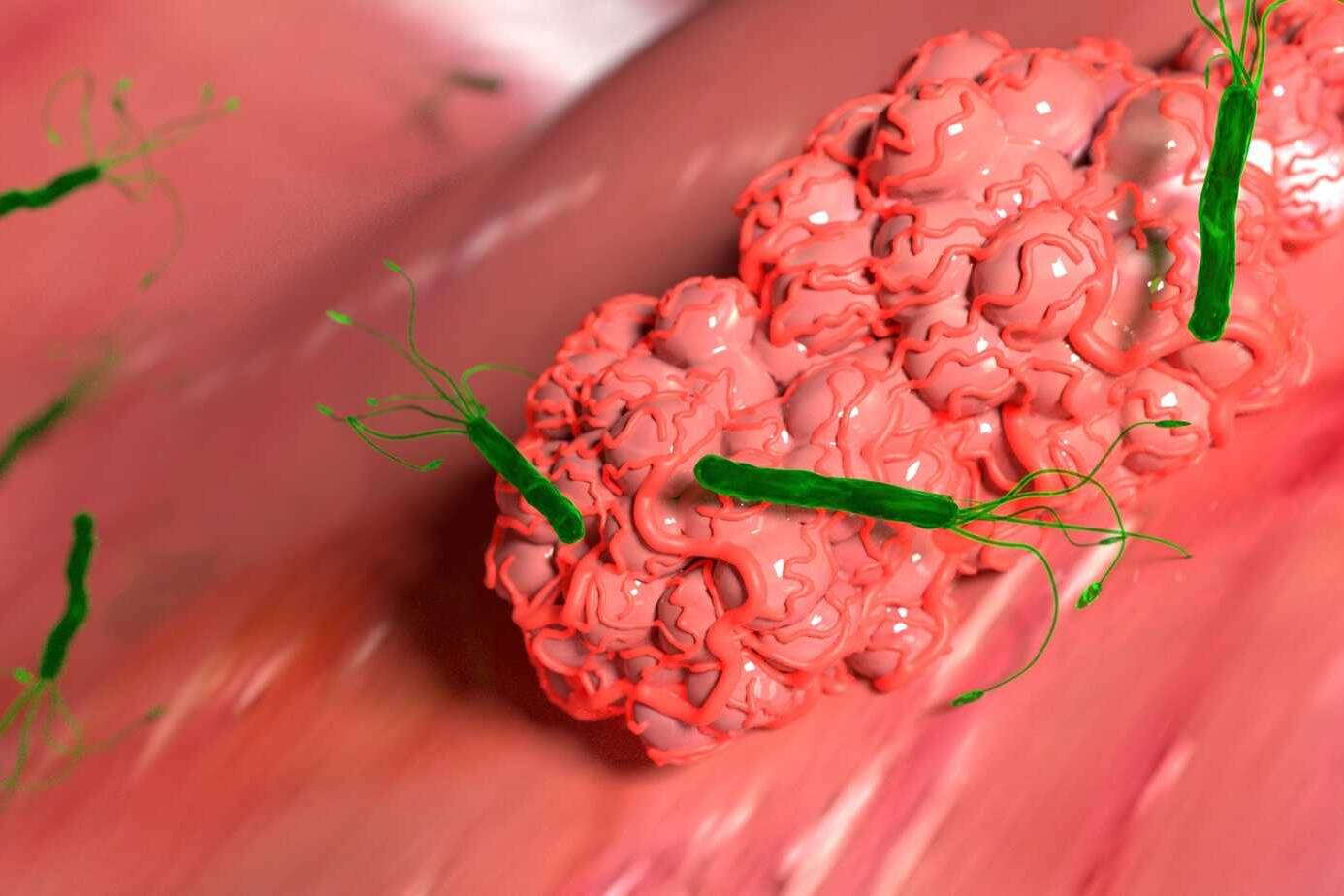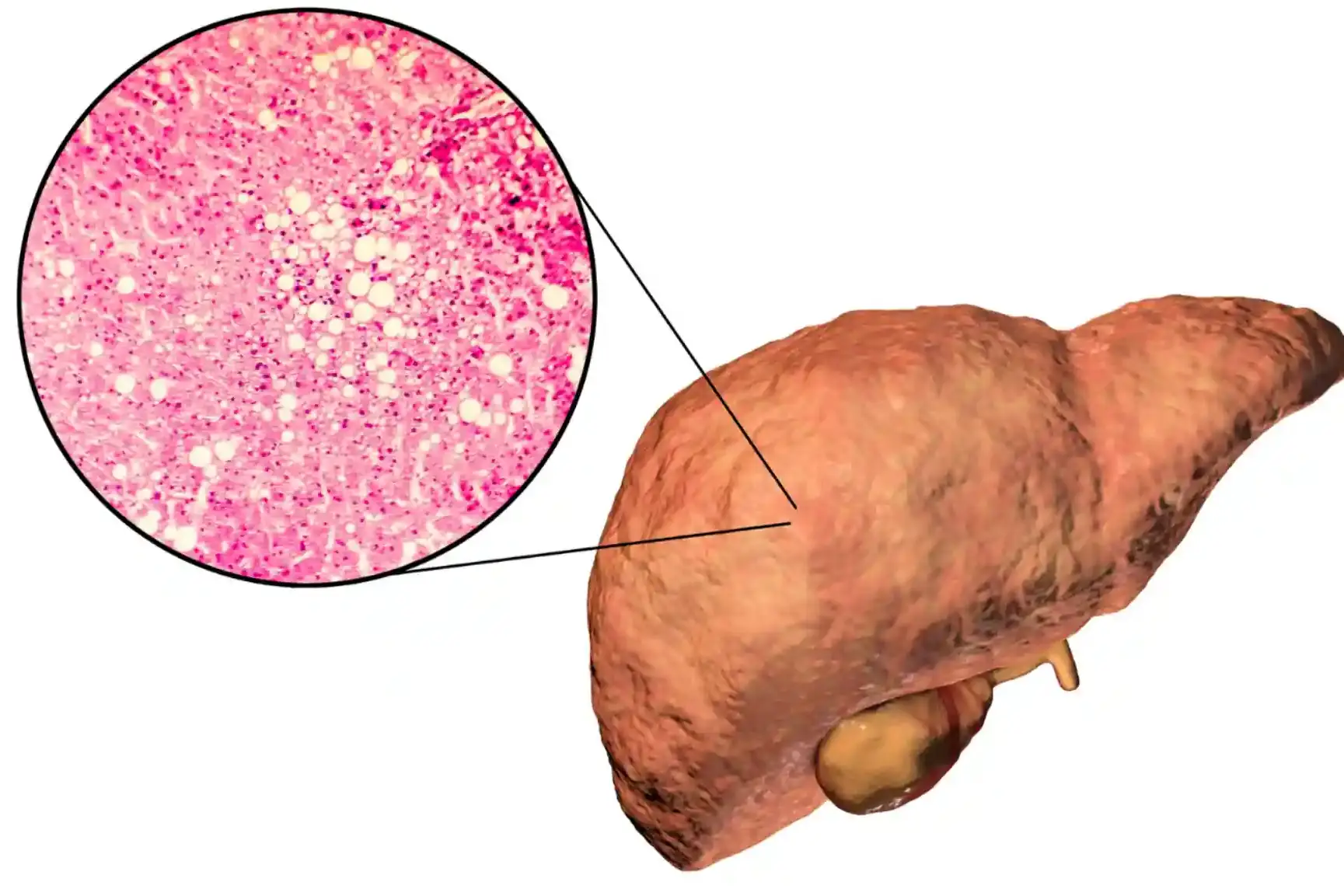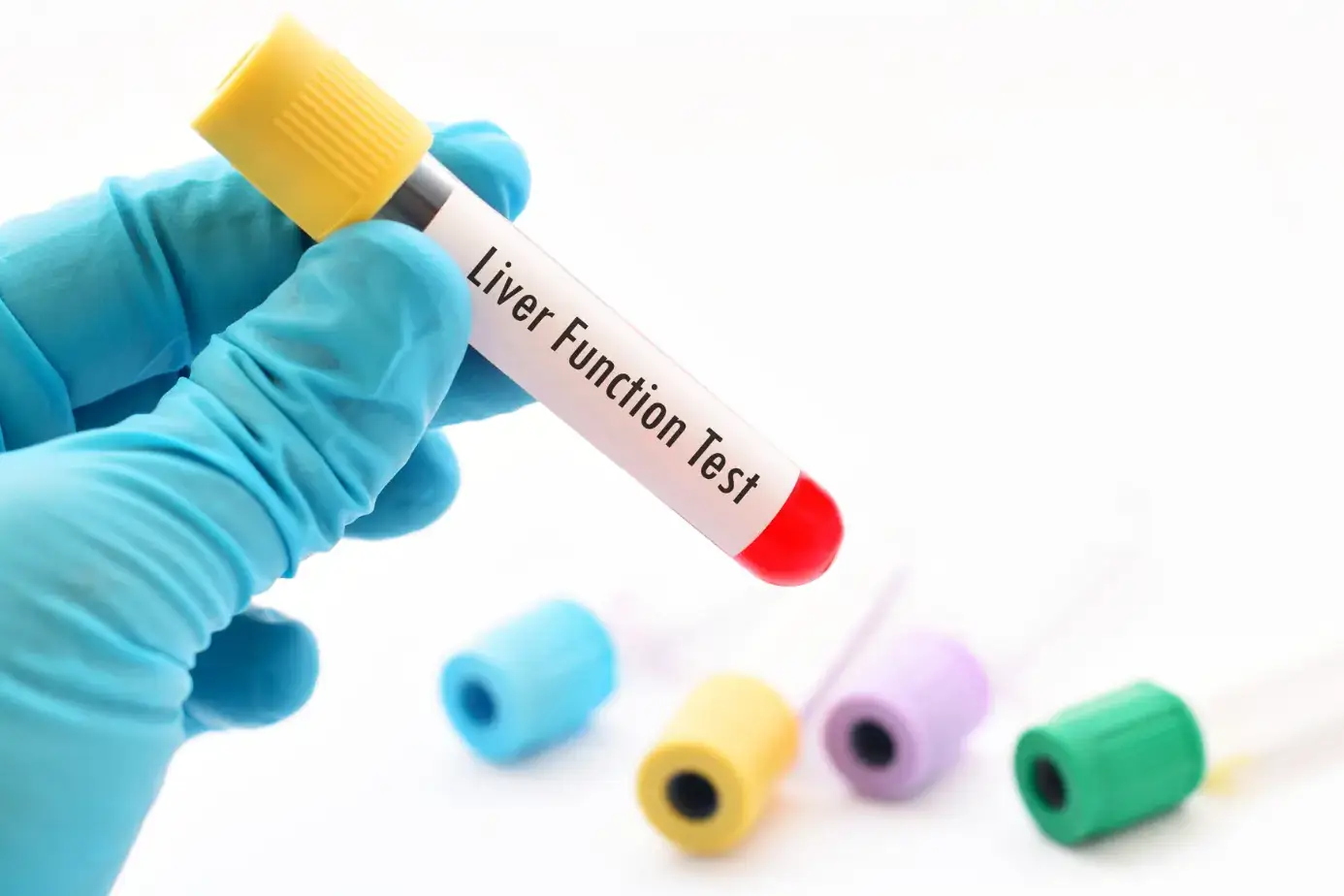Dealing with a stomach tumor diagnosis can be tough. But don’t lose hope. There are many ways to fight this disease. Whether it’s through medicines or surgeries, advancements in treatment give patients more chances to beat stomach tumors.
Table of Contents
ToggleStomach cancer, or gastric cancer, usually starts in the stomach’s inner lining. It can then invade other organs as it grows. When this happens, it becomes more difficult to treat. However, early detection boosts the chances of successful treatment against stomach tumors.
Deciding on the right treatment for stomach tumors involves looking at many factors. This includes where the cancer is and how advanced it is. Age, health, and personal choices matter too. Surgery is often the main way to remove stomach tumors for better survival odds. Yet, treatments like chemo or radiation might also be necessary, depending on the specifics.
Looking beyond the usual treatments, options like targeted drugs and immunotherapies are becoming key. They offer hope for many patients with stomach tumors. Your medical team will tailor a plan to meet your specific needs. This personalized approach ensures the best chance at overcoming the disease.
Understanding Stomach Cancer
Stomach cancer is also known as gastric cancer. It begins in the stomach’s inner lining. The cancer can grow and invade nearby organs.
It might also spread to the lymph nodes close by. As it advances, cancer can move through the blood or lymph system. From there, it can reach the liver, lungs, and bones. This makes treatment more difficult.
Types of Stomach Cancer
Several types of stomach cancer exist. Each type has its own features and treatment needs. It’s crucial to know the specific type for the best treatment plan.
Causes and Risk Factors
Many factors can raise the risk of getting stomach cancer. For instance, people may inherit genetic mutations. Chronic stomach inflammation and poor diet, like eating a lot of smoked, salted, and preserved foods, are also risks.
Some stomach cancers are hereditary. This means certain DNA changes can be passed from parents to children. These changes increase the risk of cancer.
Early Detection and Diagnosis
Finding stomach cancer early is key to better health outcomes. Unfortunately, it often shows no symptoms in the early stages. Some signs you might have stomach cancer are: being hurt in the stomach, finding it hard to swallow, feeling sick, throwing up, losing weight without trying, and seeing blood in your poop.
Symptoms of Stomach Cancer
Stomach cancer doesn’t always make you feel sick at first. But, as it grows, you might notice things like:
- Stomach pain or feeling bad in your stomach
- Finding it hard to swallow
- Feeling sick and throwing up
- Losing weight without trying
- Seeing blood in the poop or poop that looks black and sticky
If these signs sound familiar, and you’re worried about stomach cancer, see a doctor. This is especially true if you know you are at risk.
Diagnostic Tests and Procedures
Doctors use many tests to find and check for stomach cancer, like:
- Upper endoscopy (EGD): Doctors use a small camera to look inside your stomach. They may take a small piece of tissue to check under a microscope.
- Biopsy: Doctors take a small piece of tissue to be sure if you have cancer and what kind it is.
- Imaging tests: Special scans like CT and PET are used to see how far the cancer has spread. This helps doctors decide on the best treatment.
These tests help your medical team figure out how advanced your cancer is. Then, they can plan the right treatment for you.
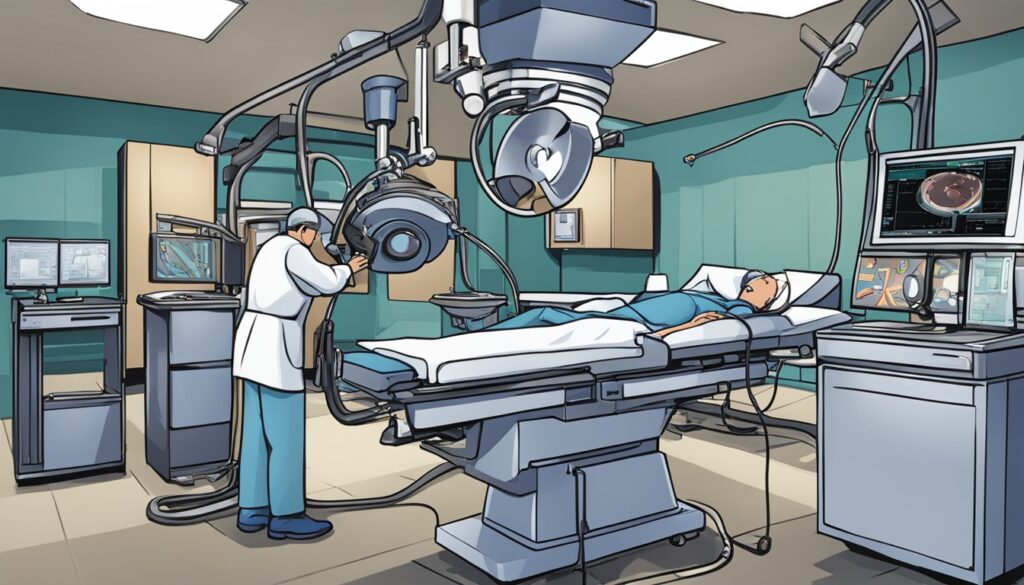
Staging of Stomach Cancer
TNM Staging System
Grasping the stage of stomach cancer is key. It guides treatment and prognosis understanding. The TNM system is often used for this. It looks at Tumor size and location, regional Lymph Nodes, and distant Metastases. Tests like endoscopic exams and imaging help figure out the cancer’s actual stage.
Importance of Accurate Staging
Knowing stomach cancer’s exact stage is vital. It helps choose the best treatment. This could be surgery, chemo, radiation, or a mix. Also, staging gives info on the disease’s likely path and long-term survival odds. The TNM staging system for stomach cancer and the importance of accurate staging help create a personalized treatment plan.
stomach tumor treatment
If you or a loved one has a stomach tumor, you’re likely looking into treatment options. Main treatments include medical, surgical, and advanced therapies. Knowing your options helps you and your team pick the best plan for you.
Medical Treatments
Chemotherapy and radiation therapy often treat stomach cancer. They might be used alone or with surgery. Chemo helps shrink the tumor and kills cancer cells. Radiation targets and destroys tumor cells.
They might give these before surgery to make it easier, or after to fight any leftover cancer. This can lower the chance of it coming back.
Surgical Options
Surgery is key for stomach cancer treatment. It provides the best shot for full recovery if the tumor can get completely removed. The surgeries vary, from small endoscopic ones to removing part or all of the stomach for larger cancers.
The surgery type depends on the cancer’s size, location, and stage. This is determined by your healthcare team.
Advanced Therapies
Targeted and immunotherapies have opened new doors in stomach cancer treatment. These methods use your body’s immune system to attack cancer or target its unique features. They are being studied in clinical trials to see how they can be used best, on their own or with other treatments.
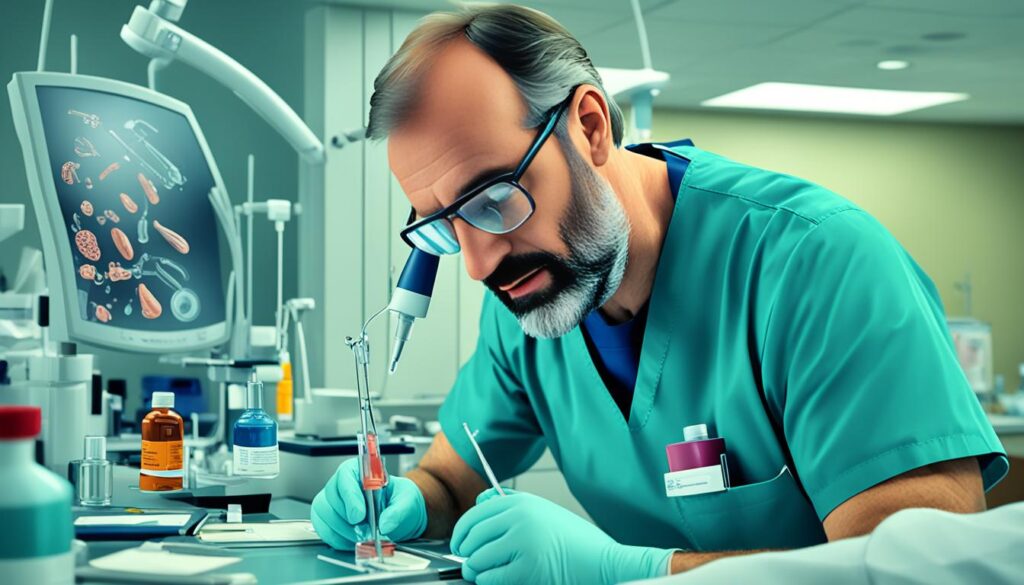
Choosing a treatment depends on many factors. Things like the cancer’s stage, your health, and what you prefer all play a part. It’s crucial to work with a skilled team to make a plan that fits you and your goals.
Treatment for Early-Stage Cancers
If you’re diagnosed with early-stage stomach cancer, options are available. For instance, endoscopic resection can be a choice. It removes the tumor and nearby healthy tissue. This is done without major surgery.
There are advanced techniques like endoscopic mucosal resection (EMR) and endoscopic submucosal dissection (ESD). They’re used to remove early-stage stomach cancers. These methods are common for cancers unlikely to spread to lymph nodes. They help keep your health impact low.
If your condition requires, you might have part of your stomach or all of it removed. After surgery, close monitoring is necessary. Sometimes, further treatments like chemotherapy or radiation are recommended. This is to ensure all cancer cells are gone.
Choosing between different treatments will depend on several factors. These include your cancer’s details, your health, and what you prefer. Your healthcare team will guide you. They’ll help craft a treatment plan that’s right for you. This is to ensure the best possible outcome.
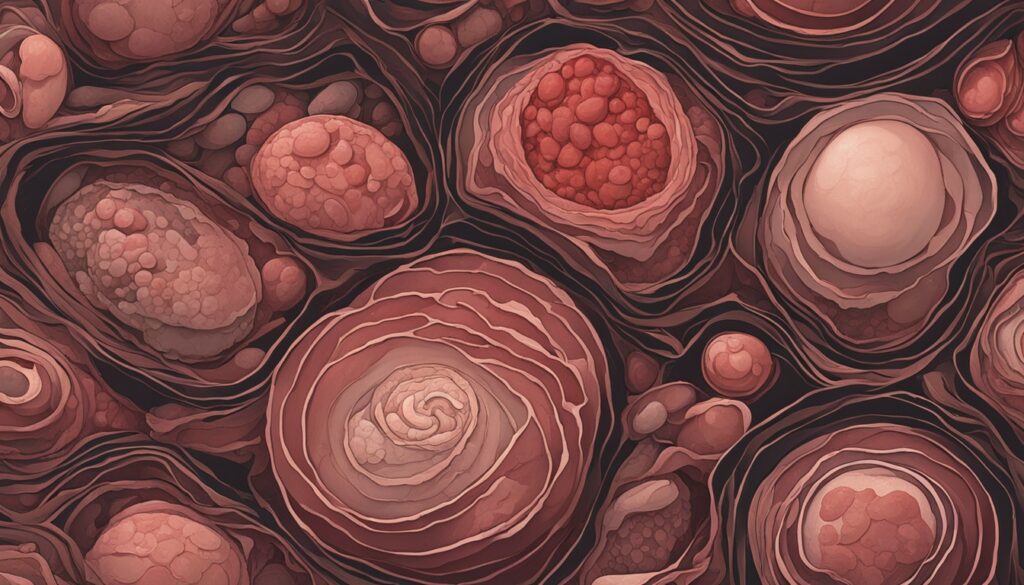
Treatment for Locally Advanced Cancers
Stomach cancers growing deep into the stomach wall need special care. They might have spread to nearby areas. Doctors recommend a mix of treatments. This way, they try to beat the advanced tumor.
Neoadjuvant Therapy
Neoadjuvant therapy is a key step in the treatment. It involves giving chemotherapy or chemoradiation before surgery. The aim is to shrink the tumor. This makes it easier to remove during surgery. It also helps in removing all visible cancer during the operation.
Surgery for Resectable Cancers
After neoadjuvant treatment, the next phase is usually surgery. This includes removing the tumor and affected areas. The surgery can be a partial or full gastrectomy. How much is removed depends on your cancer’s location and spread. Your doctor will use imaging tests and treatment responses to decide the best surgery for you.
After surgery, more treatment might be needed depending on the cancer stage. This could include further chemotherapy or chemoradiation. Post-surgery treatment aims to clear any leftover cancer cells. It also lowers the chance of the cancer coming back.
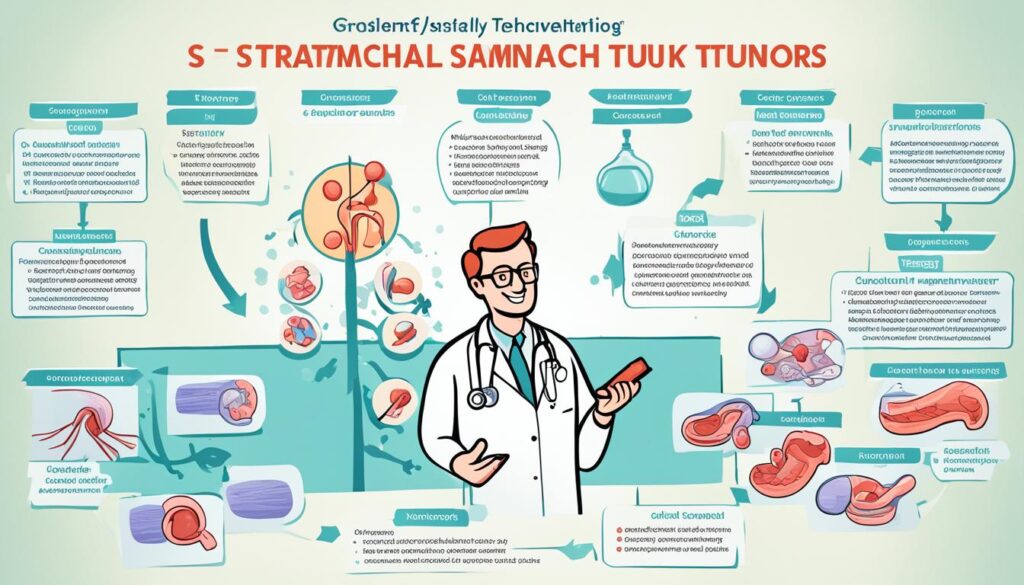
Treatment for Unresectable Cancers
When surgery can’t fully remove stomach cancer, the focus changes. Now, the goal is to slow the cancer’s growth and ease symptoms. Often, a mix of chemotherapy and radiation therapy is used first. This can make the tumor smaller and help with symptoms, even if it doesn’t cure the cancer.
Chemotherapy and Radiation Therapy
For people with unresectable stomach cancer, chemotherapy and radiation therapy may be the next step. Doctors use these together to fight the cancer in different ways. Their main goals are to make the tumor smaller and help with problems like blockages or bleeding.
Palliative Procedures
For issues like blockages or bleeding, palliative procedures are sometimes needed. These might include stent placement or surgical bypasses. They are meant to make the patient feel better. But, remember, they aren’t a cure for the cancer.
Treating unresectable stomach cancer is unique for each person. The aim is to improve their life and health as much as possible. This means customizing the treatment to fit the patient’s needs.
Treatment for Metastatic Stomach Cancer
When stomach cancer spreads to places like the liver or lungs, it’s called metastatic stomach cancer. Treatment focuses on helping people live longer and better, since curing it completely is very hard.
Systemic Therapies
Healthcare teams use many systemic therapies to handle metastatic stomach cancer. These include chemotherapy, targeted therapies, and immunotherapies. The goal is to slow the cancer down and ease symptoms, not necessarily to get rid of it all.
Supportive Care
Helping patients with their overall well-being is key. For those with later stages of the disease, care includes nutrition, pain relief, and procedures to help with issues like blockages. Supportive care aims to improve how patients feel physically, emotionally, and in their daily life.
Targeted Therapies and Immunotherapies
In the last few years, new treatments like targeted therapies and immunotherapies are offering more hope for fighting stomach cancer. Drugs that focus on HER2, like trastuzumab, work well for tumors with lots of HER2 protein. Also, immunotherapies blocking the PD-1/PD-L1 pathway are promising for some stomach cancers. This includes those with high microsatellite instability or PD-L1 levels. These treatments are more personalized, aiming to use the body’s immune system to beat cancer.
HER2-Targeted Therapies
Trastuzumab (Herceptin) fights advanced stomach cancer with the HER2 target. It can make a big difference for some people, extending their lives beyond just chemo. But, it may cause side effects like fever and nausea. Now, there are several similar drugs to trastuzumab, such as Ogivri and Trazimera.
Fam-trastuzumab deruxtecan (Enhertu) is another option for advanced HER2-positive stomach cancer, especially if trastuzumab didn’t work. It might cause issues like low blood cells and nausea. The goal is to provide effective options against the disease.
PD-L1 and Immunotherapy
Nivolumab (Opdivo) helps fight advanced stomach cancer without the HER2, but with a lot of PD-L1 protein. Another drug, pembrolizumab, is for stomach cancer with certain genetic changes. These drugs work to kickstart the body’s immune system against the cancer.
Ramucirumab (Cyramza) aims at VEGFR2 in advanced stomach cancer. By blocking VEGF, it helps stop cancer from growing. Yet, it might lead to side effects like high blood pressure. This type of treatment is helping in the fight against stomach cancer.
Scientists are always looking for new ways to treat stomach cancer, such as through targeted therapies and immunotherapies. They’re looking at how these might work alone or with chemo to make things better for patients.
Clinical Trials and Emerging Treatments
The way we treat stomach cancer is always getting better. Lots of clinical trials are trying new and advanced treatments. They mix different kinds of medicines and therapies to see what helps patients most. Being in a trial can let patients try treatments that aren’t normally used. This could be a big help.
Doctors and patients should talk about joining a clinical trial. They should weigh the good and the bad. As doctors learn more, they believe they’ll find even better ways to treat stomach cancer.
The MD Anderson Cancer Center in Texas is leading in stomach cancer trials. They focus on different stages of the disease. There are studies on new treatments and ways to use them. Now, there are some interesting trials going on:
- A study testing multiple treatments for advanced stomach cancer in different cities.
- The Bemarituzumab study compares a new drug plus chemo to chemo alone for advanced stomach cancer.
- A study on a new drug combo for severe stomach cancer.
- Another trial on a drug combo for a type of stomach cancer with a particular protein.
Besides trials, there’s ongoing research on new stomach cancer treatments. This includes drugs that target the disease or help the immune system fight it. New surgeries are also being developed. All these efforts bring fresh hope to everyone fighting stomach cancer.
Multidisciplinary Care and Treatment Planning
To manage stomach cancer well, many specialists work together. These include medical oncologists, surgical oncologists, and more. They form a team to look after every part of a patient’s treatment.
This approach helps in many ways. It ensures the patient gets the right treatments at the right times. Plus, it considers the patient’s health and wishes. Good communication with the patient and their loved ones is key for this method to work well.
In 2015, there were about 16,980 new cases of esophageal cancer and 24,590 new cases of gastric cancer in the US. These cancers made up 3% of all new cancer cases. With better treatments, survival rates have improved. However, the road to recovery can still be tough.
Many patients are not diagnosed until their cancer has grown a lot. This makes a team approach very important. The right mix of treatments and care can make a big difference for these patients.
The University of Colorado Hospital started a special clinic in August 2013 for people with esophageal and gastric cancers. This clinic brings together experts from different fields. They include doctors who treat cancer and those who help with nutrition and well-being.
At this clinic, a patient’s treatment plan is made with everyone’s input. The team does all the necessary tests and discussions over two days. This quick but thorough process helps patients get on the right treatment track faster.
Nutritional Support and Quality of Life
Maintaining good nutrition and life quality is key for stomach cancer patients. The disease and its treatments can make eating and digesting hard. They can need special diets, help from a dietitian, or even feeding tubes.
It’s also important to manage symptoms like nausea and pain. This can make meals more enjoyable. Helping patients and their families with their feelings is critical during this time.
Research shows that malnutrition lowers life quality in colorectal cancer. Nutritional status affects how advanced cancer patients feel. So, making sure stomach cancer patients get good nutritional support is vital for their quality of life.
Conclusion
Treating [conclusion on stomach tumor treatment] needs a detailed and customized approach. It uses many medical, surgical, and advanced treatment methods. Early spotting, exact staging, and a team approach are key to crafting the best treatment for every patient. Though stomach cancer presents tough challenges, breakthroughs in targeted and immune therapies have broadened treatment options. This boosts a patient’s chance for a better result.
Experimentation and clinical tests keep looking for new ways to handle this tough illness. This brings hope for better results in the future. Patients working closely with their medical teams can understand and manage [conclusion on stomach tumor treatment]. This helps to improve life quality. With ongoing hard work and new ideas, the future looks brighter for those with stomach tumors.
The stomach cancer treatment field is always progressing. It’s vital for patients and their loved ones to stay informed and involved in their care. By knowing about the newest info and options, you can cooperate with your medical team. This leads to a personal plan that meets your needs and wants. With the right strategy and help, dealing with [conclusion on stomach tumor treatment] is easier. It can help you get better results and enjoy life more.
FAQ
What are the main treatment options for stomach cancer?
The main treatment options include surgery, chemo, radiation, targeted therapy, and immunotherapy. Each plan is based on the cancer’s stage, health, and other factors.
What are the different stages of stomach cancer?
Staging uses the TNM system. This system looks at the Tumor, regional Lymph Nodes, and Metastases. Knowing the stage helps plan the best treatment.
What are the common symptoms of stomach cancer?
Stomach cancer symptoms may be abdominal pain, trouble swallowing, and weight loss. Later stages may include blood in the stool. Yet, symptoms aren’t always clear early on, making early detection key.
How is stomach cancer diagnosed?
Diagnosis includes endoscopy, biopsy, and imaging scans. Blood tests and staging laparoscopy are used too. These tests help know how far the cancer has spread and support treatment choices.
What is the role of surgery in treating stomach cancer?
If the cancer can be fully removed, surgery is vital. It gives the best chance for long survival. Options vary, from endoscopic resection to partial or full gastrectomy for advanced cases.
How do targeted therapies and immunotherapies fit into the treatment of stomach cancer?
Targeted therapies and immunotherapies have advanced treatment. They aim at empowering the immune system to attack cancer. These methods are showing positive results in certain stomach cancer types.
Why is a multidisciplinary approach important in managing stomach cancer?
Managing stomach cancer well needs a team effort. Specialists from different fields work together. This ensures the best care across all areas.
How can nutrition and quality of life be supported during stomach cancer treatment?
Maintaining nutrition and life quality is key in stomach cancer care. A dietitian’s advice and symptom management can make eating easier. Addressing emotional and social needs is also important for the patient and their family.
About The Author

Medically reviewed by Dr. Nivedita Pandey, MD, DM (Gastroenterology)
Dr. Nivedita Pandey is a U.S.-trained gastroenterologist and hepatologist with extensive experience in diagnosing and treating liver diseases and gastrointestinal disorders. She specializes in liver enzyme abnormalities, fatty liver disease, hepatitis, cirrhosis, and digestive health.
All content is reviewed for medical accuracy and aligned with current clinical guidelines.


